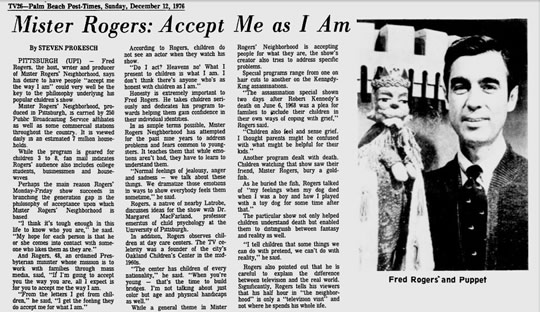Mister Rogers: Accept Me as I Am
Publication: Palm Beach Post-Times
Author: Steven Prokesch
Date: December 12, 1976
Mister Rogers: Accept Me as I Am
By Steven Prokesch
PITTSBURGH (UPI) -- Fred Rogers, the host, writer and producer of Mister Rogers' Neighborhood, says his desire to have people "accept me the way I am" could very well be the key to the philosophy underlying his popular children's show.
Mister Rogers' Neighborhood, produced in Pittsburgh, is carried by 250 Public Broadcasting Service affiliates as well as some commercial stations throughout the country. It is viewed daily in an estimated 7 million households.
While the program is geared for children 3 to 8, fan mail indicates Rogers' audience also includes college students, businessmen and housewives.
Perhaps the main reason Rogers' Monday-Friday show succeeds in branching the generation gap is the philosophy of acceptance upon which Mister Roger's Neighborhood is based.
"I think it's tough enough in this life to know who you are," he said. "My hope for each person is that he or shee comes into contact with someone who likes them as they are."
And Rogers, 48, an ordained Presbyterian minister whose mission is to work with families through mass media, said, "If I'm going to accept you the way you are, all I expect is for you to accept me the way I am.
"From the letters I get from children," he said, "I get the feeling they do accept me for what I am."
According to Rogers, children do not see an actor when they watch his show.
"Do I act? Heavens no! What I present to children is what I am. I don't think there's anyone who's as honest with children as I am."
Honesty is extremely important to Fred Rogers. He takes children seriously and dedicates his program towards helping them gain confidence in their individual identities.
In as simple terms possible, Mister Rogers' Neighborhood has attempted for the past nine years to address problems and fears common to youngsters. It teaches them that while emotions aren't bad, they have to learn to understand them.
"Normal feelings of jealousy, anger and sadness -- we talk about these things. We dramatize those emotions in ways to show everybody feels them sometime," he said.
Rogers, a native of nearby Latrobe, discusses ideas for the show with Dr. Margaret MacFarland, professor emeritus of child psychology at the University of Pittsburgh.
In addition, Rogers observes children at day care centers. The TV celebrity was a founder of the city's Oakland Children's Center in teh mid-1960s.
"The center has children of every nationality," he said. "When you're young -- that's the time to build bridges. I'm not talking about just color but age and physical handicaps as well."
While a general theme in Mister Rogers' Neighborhood is accepting people for what they are, the show's creator also tries to address specific problems.
Special programs range from one on hair cuts to another on the Kennedy-King assassinations.
"The assassination special shown two days after Roger Kennedy's death on June 6, 1968 was a plea for families to include their children in their own ways of coping with greif," Rogers said.
"Children also feel and sense grief. I thought parents might be confused with what might be helpful for their kids."
Another program dealt with death. Children watching that show saw their friend, Mister Rogers, bury a goldfish
As he buried the fish, Rogers talked of "my feelings when my dog died when I was a boy and how played with a toy dog for some time after that."
The particular show not only helped children understand death but enabled them to distinguish between fantasy and reality as well.
"I tell children that some things we can do with pretend, we can't do with reality," he said."
Rogers also pointed out that he is careful to explain the difference between television and the real world. Significantly, Rogers tells his viewers that his half hour in "the neighborhood" is only a "television visit" and not where he spends his whole life.

